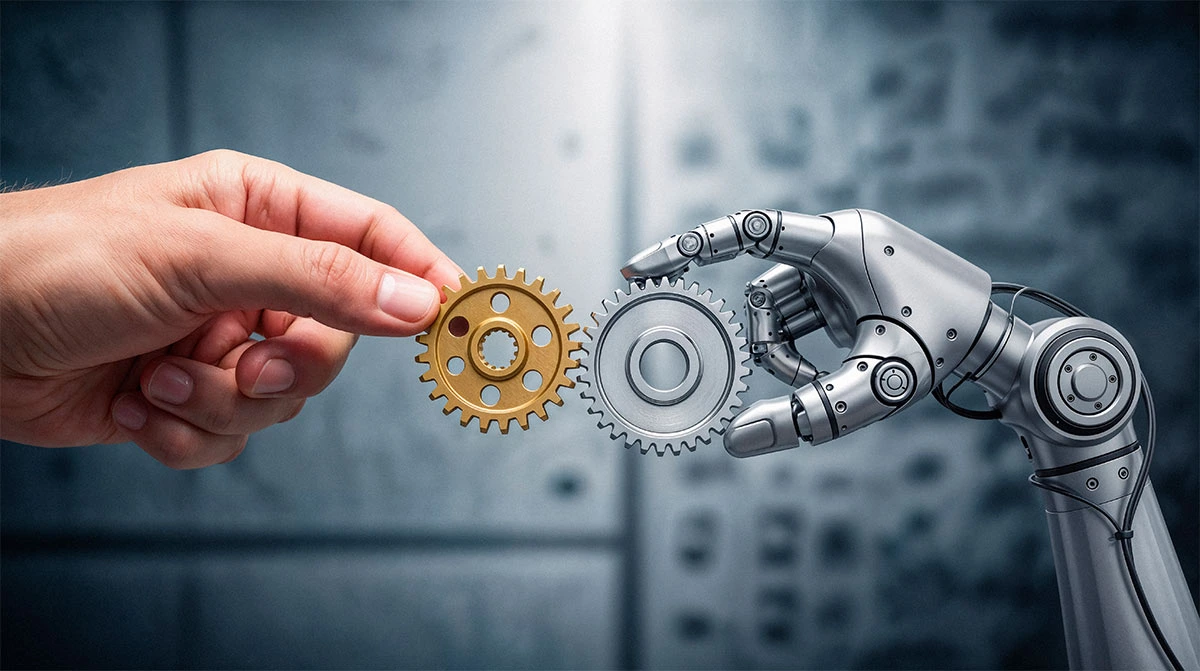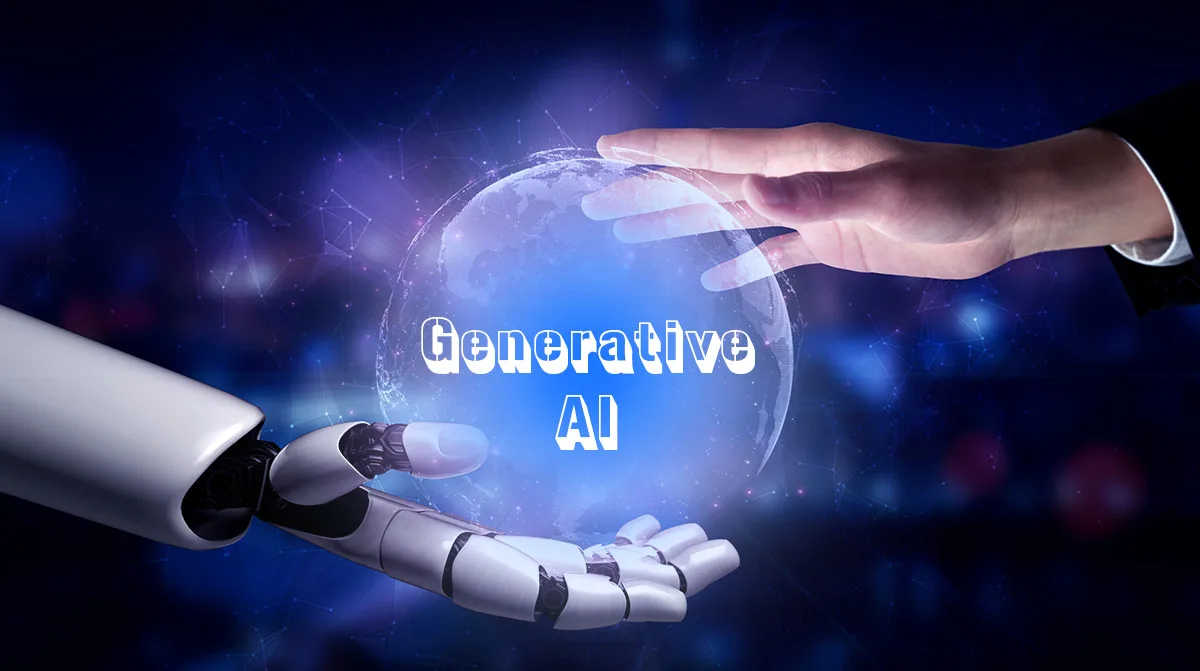We’re entering a new era of automation~ smarter, faster, and more human-like than ever. For years, businesses used basic automation to handle repetitive tasks, but those tools couldn’t adapt or manage complex workflows. That’s where AI agents come in.
Unlike traditional tools, AI agents act like digital teammates; they can reason, plan, and execute tasks with minimal input. This shift from simple to intelligent automation unleashes huge potential for productivity and innovation across industries.
In this piece, we’ll explain what AI agents are, why traditional workflows fail, and how real-world businesses already use them to transform operations. Most importantly, we’ll consider what the future of work could be a world where human creativity and machine intelligence go hand in hand.
What Exactly Are AI Agents?
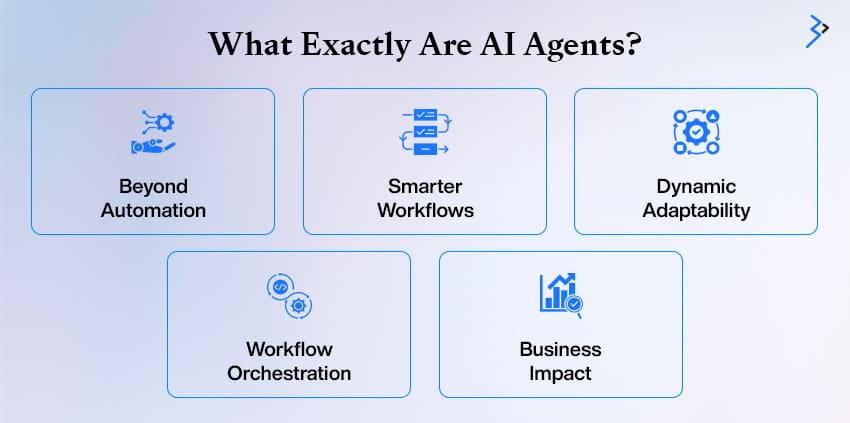
At their core, AI agents are intelligent digital teammates, software entities built to perceive their environment, make independent decisions, and take action to achieve a goal. Unlike a simple chatbot or a Robotic Process Automation (RPA) tool, which follow rigid, predefined rules, AI agents bring reasoning, adaptability, and autonomy.
Here’s the difference in action:
- A traditional RPA tool might pull data from an email and paste it into a spreadsheet. It’s useful, but limited.
- An AI agent, on the other hand, can manage the entire employee onboarding journey from start to finish:
- Gathering and validating information from the new hire
- Sending a personalized welcome email
- Creating accounts across HR, IT, and finance systems
- Ordering the required equipment
- Scheduling orientation or training sessions
- Following up with reminders to ensure nothing falls through the cracks

What sets AI agents apart is their ability to plan and adapt dynamically. They can jump across different systems, handle real-time unexpected errors, and generate context-aware, personalized content. These tools are more than mere automation solutions; they function as orchestrators that seamlessly connect multiple components into a cohesive, end-to-end workflow.
The impact is profound: Instead of employees spending hours on repetitive, manual tasks, AI agents free them to focus on strategy, creativity, and problem-solving. In other words, they don’t just get work done faster; they redefine how work gets done, creating more innovative, scalable, and resilient processes for the modern enterprise.
Read More – Agentic Chatbots: Empowering AI with Tools and Reasoning
The Problem with Traditional Workflows
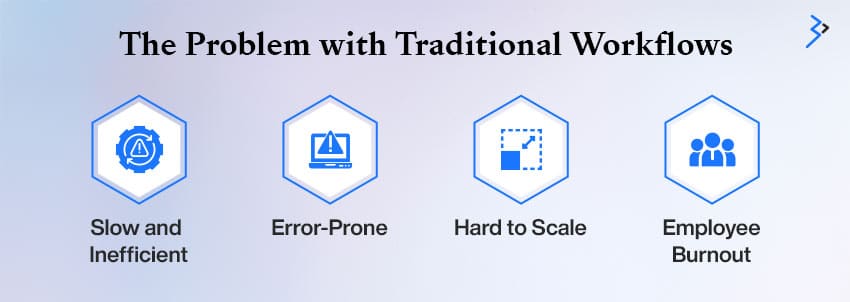
For decades, organizations have designed their workflows around people’s manual inputs, endless reviews, and oversight at every step. While this made sense in the past, it’s now creating serious challenges in today’s fast-paced, data-driven world.
- Slow and Inefficient: Consider how long it takes to prepare quarterly financial reports. Multiple teams spend hours gathering, entering, and cross-checking data. These bottlenecks slow down decision-making and make businesses less responsive.
- Error-Prone: Humans get tired, and repetitive work almost guarantees mistakes. A single wrong number in a spreadsheet can cost money, delay projects, or create compliance risks. Despite better tools being available, 89% of finance teams still rely heavily on Excel, a method that remains prone to human error.
- Hard to Scale: Manual processes become more complicated as businesses grow. Hiring more people to move data around is expensive and unsustainable, and this lack of scalability holds back growth.
- Employee Burnout: The most overlooked consequence of traditional workflows? It’s the impact on your team’s morale. Repetitive, unchallenging tasks stifle creativity and lead to disengagement. And today, skills like AI fluency are outperforming years of experience.
A 2024 report from Microsoft and LinkedIn found that 66% of business leaders would not hire a candidate who lacks AI skills. Furthermore, 71% of these leaders prefer a less experienced candidate with AI skills over a more experienced candidate without them.
AI agents are where the game changes. Instead of fixing one step at a time, they automate entire workflows, connecting data, reducing errors, and freeing employees to focus on high-value tasks that demand creativity, empathy, and strategic thinking.
AI Agents in Action: Transforming Enterprise Functions
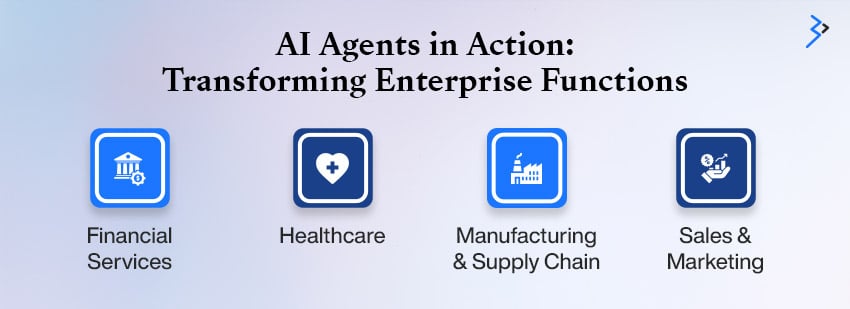
Leading organizations actively integrate AI agents into their operations; they are not just futuristic ideas. By handling repetitive, rule-based, and data-heavy work, they reduce human error, speed up execution, and free employees to focus on high-value contributions.
Here’s a look at how different industries are putting them to work:
Closing books and reconciling accounts used to mean long hours and late nights. Today, AI agents automate expense reports, reconcile accounts in minutes, and support accurate forecasting. Companies adopting financial automation report up to a 90% reduction in reporting errors and faster month-end and quarter-end cycles. This improves accuracy and gives finance professionals more time to advise on business strategy rather than just crunching numbers.
Healthcare systems are overloaded with paperwork, but AI agents are taking the pressure off. They schedule appointments, update patient records, and manage billing or claims, tasks that once consumed thousands of staff hours. In fact, one large-scale rollout saved the equivalent of hundreds of staff years by automating admin across departments. That’s the time doctors and nurses now spend with patients, resulting in improved efficiency, staff satisfaction, and better care delivery.
Manufacturing & Supply Chain
For manufacturers, every minute of downtime costs money. AI agents invest in predictive maintenance, real-time monitoring, and logistics optimization. By spotting issues before machines fail, companies minimize costly breakdowns. Predictive maintenance and inspection are now among the fastest-growing AI applications in manufacturing, helping reduce operating costs, increase throughput, and keep supply chains resilient in unpredictable markets.
Sales & Marketing
AI agents are revolutionizing how companies connect with customers. They qualify leads, personalize campaigns, and automate repetitive tasks like content drafting or scheduling. Instead of wasting energy on routine outreach, sales reps and marketers receive intelligent insights and pre-drafted actions. Research shows that human–AI collaboration boosts productivity significantly, allowing teams to scale output while focusing on creativity, storytelling, and building stronger customer relationships.
Read More – Demystifying AI Agents: Capabilities, Use Cases, and Implementation
The “Why Now” Moment: Hype vs. Reality
AI agents hold enormous potential, but the road to adoption isn’t as straightforward as the hype suggests.
A recent MIT study revealed that 95% of generative AI projects fail to deliver meaningful transformation, showing that many businesses struggle to turn experimentation into ROI. The reason? Companies often jump in without a solid strategy, clean data, or the right expertise, treating AI as a quick fix instead of a collaborative tool.
Yet, the momentum is undeniable. A Cloudera survey (2025) found that 96% of enterprises plan to expand their use of AI agents in the next 12 months, with most aiming for enterprise-wide rollouts.
Even more encouraging, a Google Cloud study reported that 74% of executives already see ROI within the first year of AI agent deployment, and over half credit generative AI to drive measurable business growth.
The key takeaway is that AI isn’t a magic solution. However, it transitions from hype to meaningful business impact when implemented with a clear strategy, solid data foundations, and integration into existing workflows.
The Road Ahead: Overcoming Challenges and Building a Seamless Future
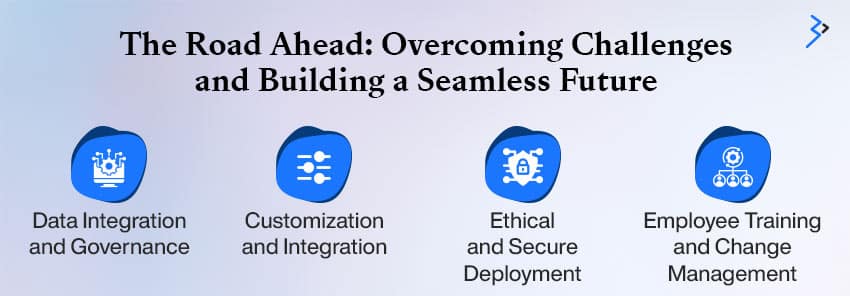
Moving to an AI-driven workforce isn’t just about adding new tools; it’s a profound transformation in how businesses operate, innovate, and grow. To get it right, organizations need to overcome a few significant hurdles, each of which plays a crucial role in shaping long-term success.
Data Integration and Governance
AI agents thrive on information only if that data is accurate, secure, and easy to access. Companies must build a strong data foundation that connects multiple systems into one seamless flow. Clear governance practices are also essential to ensure compliance, maintain privacy, and keep decision-making reliable. Without this backbone, AI can’t perform at its best.
Customization and Integration
Since every business operates differently, the most effective AI solutions are those customized to your company’s unique workflows through intelligent, multi-agent systems. These solutions don’t just automate, they integrate smoothly with existing tools and teams, reducing friction while amplifying efficiency.
Ethical and Secure Deployment
Trust is everything in the age of AI. From preventing bias to protecting sensitive data, businesses must approach AI responsibly. Transparent and auditable systems help ensure accountability, while robust cybersecurity measures safeguard against growing digital threats. When done right, ethical deployment strengthens both compliance and customer confidence.
Employee Training and Change Management
The future of work isn’t humans versus machines, it’s humans and AI working together. However, this partnership only succeeds if employees feel empowered, not threatened. Companies must invest in reskilling programs to shift workers from repetitive tasks to roles requiring creativity, strategy, and critical thinking. Pair this with strong change management, open communication, and reassurance about job security, and AI becomes a tool for empowerment rather than fear.
Conclusion
The future of work isn’t man versus machine, it’s man with machine. A hybrid model where humans and intelligent AI agents collaborate will redefine businesses’ operations. These agents rapidly evolve and can handle increasingly complex, dynamic tasks with precision. By offloading routine, repetitive work to AI, employees can focus on what truly matters: creativity, strategy, innovation, and empathy, the human strengths that fuel growth and lasting impact.
But this transformation doesn’t happen by chance; it requires vision, strategy, and the right partner. That’s where Brainvire comes in. More than a technology provider, Brainvire helps businesses reimagine workflows from the ground up. From building strong data foundations to developing custom multi-agent ecosystems and ensuring ethical deployment, Brainvire empowers organizations to embrace intelligent automation with confidence.
The time to act is now. With the right approach and a trusted partner like Brainvire, your business can unlock a more efficient, intelligent, and rewarding future where humans and AI grow stronger.
FAQs:-
Manual workflows are slow, error-prone, and difficult to scale. They create bottlenecks, increase the risk of mistakes, and lead to employee disengagement, making businesses less agile and efficient.
AI agents automate entire processes, not just individual tasks. They reduce errors, connect data across systems, streamline operations, and free employees to focus on high-value work that requires creativity and strategic thinking.
Repetitive tasks can lead to disengagement, lower morale, and decreased productivity. Reports show that 66% of business leaders now prefer hiring candidates with AI skills, even if they have less experience, highlighting the shift toward valuing innovative and tech-savvy skills.
Industries with complex, repetitive, or high-volume processes benefit greatly. Examples include finance, professional services, B2B e-commerce, and manufacturing, where AI agents can automate data entry, research, customer support, and lead qualification.
The key is a strategic approach: integrate AI agents thoughtfully with clear goals, clean and connected data, and a focus on collaboration rather than replacement. Companies that plan well see faster decision-making, higher productivity, and measurable ROI.
Related Articles
-
From Manual Chaos to Automated Precision: How AI Workflow Management Redefines Contracting
Managing contracts has felt like solving a puzzle in the dark for far too long. It’s a process defined by fragmented emails, scattered spreadsheets, and endless document versions saved in
-
The Future of Business Is Here: Artificial Intelligence and Odoo ERP
Businesses have unquestionably transformed in recent years thanks to artificial intelligence (AI), which has opened up previously unimaginable opportunities for expansion and reinvention. Odoo Enterprise Resource Planning (ERP) has also
-
Generative AI: Redefining the Boundaries of Traditional Machine Learning
Artificial Intelligence (AI) has revolutionized industries worldwide, with machine learning (ML) driving automation, predictions, and data analysis. Traditional ML models rely on structured data to identify patterns and make decisions,


